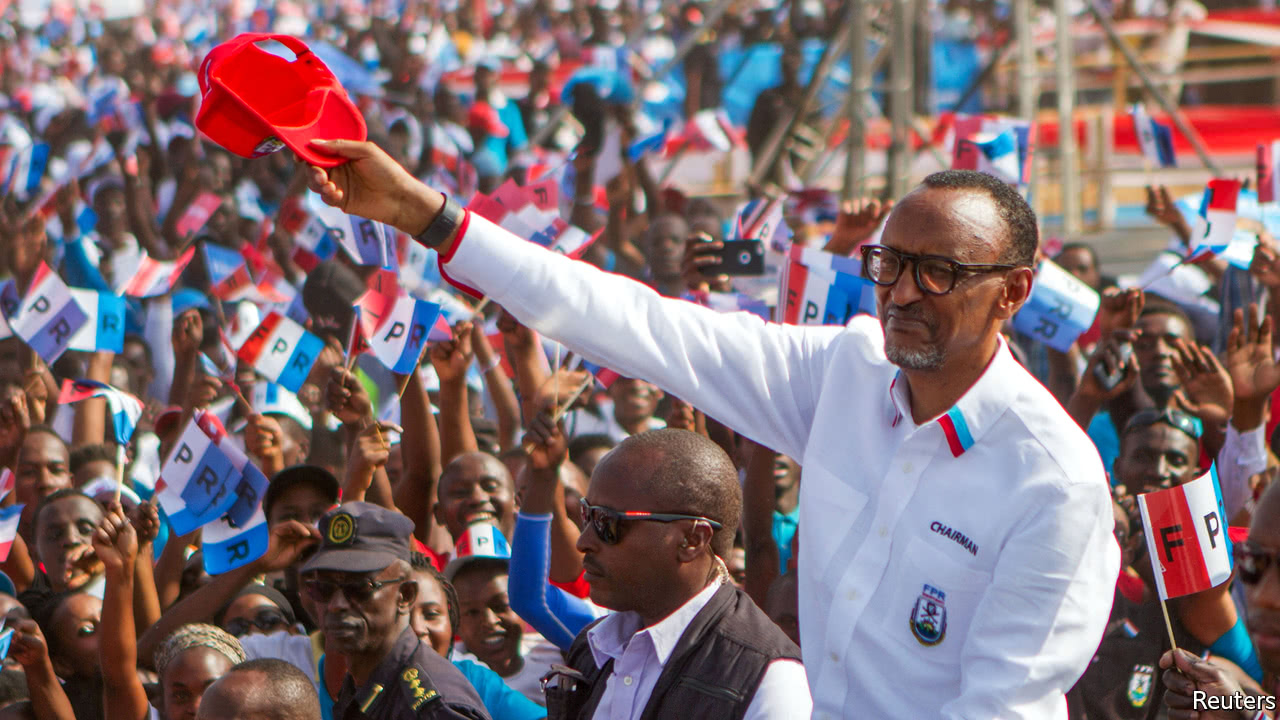They calculate that the costs of doing so are low
YESTERDAY, August 4th, Rwanda’s president of 17 years, Paul Kagame (pictured), will be re-elected for a third term (the result is not in question). This concludes a process that began in 2015 when his party, the ruling Rwandan Patriotic Front, proposed a constitutional amendment to allow Mr Kagame to outstay the two-term limit. In neighbouring Democratic Republic of Congo the president, Joseph Kabila, has long been mulling a similar ruse. He should have left office last December. In nearby Burundi, Pierre Nkurunziza announced in 2015 that he would stand for a controversial third term as president. A plan to amend or ditch term limits entirely is expected to be announced this autumn. And tomorrow, August 5th, Mauritanians will vote in a constitutional referendum that critics see as paving the way for a third term, too. If they succeed, these presidents will join the ranks of the 13 African heads of state who have successfully rolled back term limits. Why are they doing this?
Term limits became common in Africa with the wave of democratisation that swept the continent in the 1990s. Most countries included them in their constitutions after pressure from America and African democracy activists. Today there is widespread support for them. Afrobarometer, a polling firm, found that about three-quarters of people in 34 African countries said that presidential mandates should be restricted to two terms. Rwanda is an exception: nearly 4m Rwandans signed a “spontaneous” petition to let Mr Kagame stay on, and only ten people openly opposed it. But Mr Kagame rules his country through fear. In other countries, such as Burkina Faso in 2014, street protests forced the then president, Blaise Compaoré, to backtrack and flee the country. In 2015 Mr Kabila’s neighbour across the river in Congo-Brazzaville, Denis Sassou-Nguesso, successfully won a referendum allowing a third term—but provoked violent unrest in the process. Burundi has been in bloody turmoil ever since Mr Nkurunziza’s declared his third-term intentions.
Presidents go ahead because they know the costs of doing so are low. Mr Kagame, still feted by foreign donors and prominent world leaders despite his growing authoritarianism, knew he could change the constitution without provoking a backlash from the international community. Mr Sassou-Nguesso made the same calculation. The Congolese president is seen by many, including France, the former colonial power, as a reliable partner, and the country is regarded as an island of stability in an otherwise troubled region. Moreover the rising influence of China means that African presidents know the West’s leverage is weaker than it once was. They also know that its priorities have shifted: combating jihadism is today more important than promoting democracy.
Term limits tend to be respected where democracy is already well established. Weak institutions make it easier for presidents to do away with them. Mr Nkurunziza was helped by a pliant constitutional court. Mr Kagame could count on his rubber-stamp parliament. And in many African countries where presidents have rolled back term limits the strongest institution is the army. Mr Kagame, Mr Nkurunziza and Mr Kabila are former rebel leaders who came to power through military victory; so too is the president of neighbouring Uganda, Yoweri Museveni, who successfully abolished term limits in 2005. The presidents of these central African countries where respect for term limits today is weakest are not by their nature democrats. Elsewhere on the continent, however, the picture is different: in Benin, Burkina Faso, Senegal and Nigeria recent attempts to sidestep term limits have failed.
Term limits became common in Africa with the wave of democratisation that swept the continent in the 1990s. Most countries included them in their constitutions after pressure from America and African democracy activists. Today there is widespread support for them. Afrobarometer, a polling firm, found that about three-quarters of people in 34 African countries said that presidential mandates should be restricted to two terms. Rwanda is an exception: nearly 4m Rwandans signed a “spontaneous” petition to let Mr Kagame stay on, and only ten people openly opposed it. But Mr Kagame rules his country through fear. In other countries, such as Burkina Faso in 2014, street protests forced the then president, Blaise Compaoré, to backtrack and flee the country. In 2015 Mr Kabila’s neighbour across the river in Congo-Brazzaville, Denis Sassou-Nguesso, successfully won a referendum allowing a third term—but provoked violent unrest in the process. Burundi has been in bloody turmoil ever since Mr Nkurunziza’s declared his third-term intentions.
Latest updates
Term limits tend to be respected where democracy is already well established. Weak institutions make it easier for presidents to do away with them. Mr Nkurunziza was helped by a pliant constitutional court. Mr Kagame could count on his rubber-stamp parliament. And in many African countries where presidents have rolled back term limits the strongest institution is the army. Mr Kagame, Mr Nkurunziza and Mr Kabila are former rebel leaders who came to power through military victory; so too is the president of neighbouring Uganda, Yoweri Museveni, who successfully abolished term limits in 2005. The presidents of these central African countries where respect for term limits today is weakest are not by their nature democrats. Elsewhere on the continent, however, the picture is different: in Benin, Burkina Faso, Senegal and Nigeria recent attempts to sidestep term limits have failed.


No comments:
Post a Comment